|
|
|
Sort Order |
|
|
|
Items / Page
|
|
|
|
|
|
|
| Srl | Item |
| 1 |
ID:
184117
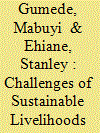

|
|
|
|
|
| Summary/Abstract |
This paper explores the extent to which land ownership through restoration results in non-sustainability in the Nonoti community in South Africa. During the apartheid era, Black communities were evicted from their ancestral land to make way for tourism development, though those lands were later repossessed by their original owners. This study aims at exploring the challenges of post-settlement after land restoration to new landowners in the Nonoti Beach resort. This paper is anchored on the sustainable livelihoods theoretical framework to measure the extent to which land can enhance socio-economic development. This study adopted a qualitative research design using in-depth interviews and focus groups. The sample of this study was drawn from the Nonoti local community members and representatives of the government agencies in charge of land restoration. The study concludes that landowners should be capacitated through training and skills development to live sustainably on the land they have acquired through the land claims process.
|
|
|
|
|
|
|
|
|
|
|
|
|
|
|
|
| 2 |
ID:
184125


|
|
|
|
|
| Summary/Abstract |
Sri Lanka’s ethnic civil war between the Liberation Tigers of Tamil Eelam (LTTE), also known as the Tamil Tigers, and the government of Sri Lanka comprising the majority of the Sinhalese Buddhist community came to a bloody end in May 2009. Muslims, whose political and civil society elite had largely supported the Sri Lankan state and security forces, welcomed the end of the war and the defeat of the Tamil Tigers given the history of the community with the LTTE. The expectations by the Muslims (and other communities) that peace would return to the country, were quickly dashed as it appeared that a new extremist Sinhala-Buddhist nationalist movement targeting religious minorities especially the Muslims would emerge as the country grappled with post-war reconciliation. The rise of anti-Muslim rhetoric, hate speech, and incitement to violence against the community has pushed some Muslims to think that they have become the new focus for Sinhala-Buddhist extremists in the wake of the defeat of the Tamil Tigers. With suspicions of the complicity of the state apparatus in the anti-Muslim campaign, there are serious concerns around the role and place of minorities (non-Sinhala and non-Buddhist) in the future makeup of the country. While there is no concrete evidence on the state’s support for such an action, it is clear that the reluctance of the state to bring to justice those responsible for hate speech and incitement to violence since 2009 raises some serious questions about impartiality. In addition, with the increase of detentions and scrutiny of the Muslim community’s post-Easter Sunday attacks and the recent treatment of the Muslim community in the response to the ongoing global COVID-19 pandemic, including shutting down of key Muslim towns and the enforcement of forced cremations (which goes against Islamic teachings of dignified burials), there is much to ponder of an anti-Muslim strategy being mainstreamed and institutionalized by the state. This paper will seek to situate the present response to the COVID-19 pandemic by the state and its particular actions affecting the Muslim community amid a wider backdrop of a rise in anti-Muslim hatred and action. In order to understand this, the paper will seek to understand the reasoning behind why Muslims who supported the war against the Tamil Tigers, have now become the enemy for Sinhala-Buddhist extremists. It does this through primary and secondary data gathering including interviews conducted between July 2020 and February 2021. In so doing this paper will explore the development of Muslim political and religious identity by looking at a historical perspective. This paper makes the argument that a holistic approach needs to be developed to avoid a new conflict taking place in Sri Lanka and to avoid violent Islamist extremism taking hold.
|
|
|
|
|
|
|
|
|
|
|
|
|
|
|
|
| 3 |
ID:
184120


|
|
|
|
|
| Summary/Abstract |
Reducing the huge level of food losses and waste is arguably one of the sustainable ways of closing the food requirement gap in developing countries. Examining selected sub-Saharan Africa countries and utilizing the Food and Agriculture Organization of the United Nations’ Food Balance Sheet data, this study suggests that these countries lose over 29% (58.8 million tons) of the primary equivalent component of food. Exploiting the rich data on water and land footprints of food commodities, this study also identified considerable losses in resources – 21% of total water use and 15% of cropland use – associated with the food supply chain losses, with noticeable implications for agricultural sustainability.
|
|
|
|
|
|
|
|
|
|
|
|
|
|
|
|
| 4 |
ID:
184122


|
|
|
|
|
| Summary/Abstract |
Rural communities depend on land for socio-economic livelihoods. However, owning land remains a critical challenge in post-independence Namibia for women, despite institutionalised laws and policies designed to redress gender inequalities. This paper discourses on the hindrances to equitable communal land ownership in nine regions among women aged 18–60 years. Findings reveal a high perception among women themselves that women should own land in communal areas. The study concludes that the struggle for equitable land distribution is far from being over, despite various government interventions to address the status quo, and hence recommends the overhaul of existing legal frameworks.
|
|
|
|
|
|
|
|
|
|
|
|
|
|
|
|
| 5 |
ID:
184119
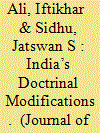

|
|
|
|
|
| Summary/Abstract |
This paper assists in understanding contesting technological capabilities and doctrinal modification between India and Pakistan that are drifting South Asia towards instability, leaving the nuclear deterrence in a dark abyss. Hawks on both sides of the nuclear armed rivals are unprecedentedly chanting threats of nuclear war. More bothersome is the indications of shifting the Indian policy of No First Use (NFU), calls for doctrinal modifications and counterforce temptations. An Indian quest for escalation dominance and Pakistani quest for stability against India is in fact a mutual struggle beyond ‘minimum credible’ to ‘assured second strike’ capabilities.
|
|
|
|
|
|
|
|
|
|
|
|
|
|
|
|
| 6 |
ID:
184126
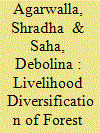

|
|
|
|
|
| Summary/Abstract |
The forest as an ecosystem plays a vital role in protecting the environment and meeting indispensable human needs. Restrictions on forestry activities for safeguarding the environment and seasonality in collection often count for vulnerable livelihood of the forest-fringe dwellers. This paper is an attempt to assess the existing opportunities for livelihood diversification of the forest dwellers residing at the Simlipal National Park region, India, through the Herfindahl–Hirschman Index; and to determine the key factors responsible for the scopes and realization of livelihood diversification through econometric modeling. The analysis is done across blocks with having different forest-zonal geographies and human characteristics to comprehend and ensure sustainable livelihood for a better future.
|
|
|
|
|
|
|
|
|
|
|
|
|
|
|
|
| 7 |
ID:
184127
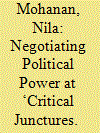

|
|
|
|
|
| Summary/Abstract |
From a feminist institutionalist perspective, this article engages in a comparative analysis of South Africa, one of the only post-transition democracies where women organized as a distinct interest group representing gender interests were able to negotiate and gain access to political power, and India, where women’s participation was predominantly as ‘nationalist women’. It argues that constitution drafting is a decisive critical juncture when descriptive representation can be translated very effectively into the substantive representation of women as equal citizens, provided women qua women and as gender-conscious agents are able to intervene to promote the cause of their effective political participation.
|
|
|
|
|
|
|
|
|
|
|
|
|
|
|
|
| 8 |
ID:
184129
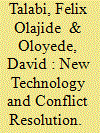

|
|
|
|
|
| Summary/Abstract |
This study tests the effectiveness of a music-based counselling intervention that was digitally recorded on 470 herdsmen in Nigeria. The study was a quasi-experiment with the questionnaire as the instrument for data collection. The result of the study showed that the intervention was effective because respondents in the treatment group scored higher regarding the acceptance of ranching, had more positive intention towards cattle ranching, and more readiness to address challenges that come with cattle ranching than their counterparts in the control group. The researchers highlighted the theoretical and practical implications of the results.
|
|
|
|
|
|
|
|
|
|
|
|
|
|
|
|
| 9 |
ID:
184124


|
|
|
|
|
| Summary/Abstract |
The paper interrogates the resilience of female sex workers in the wake of COVID-19 in Zimbabwe. The paper draws literature from global, regional and national perspectives using the resilience theory. Major findings reveal that the COVID-19 lockdown measures have disrupted the livelihoods of female sex workers. Hence, female sex workers have resorted to online sex work and some entrepreneurship. There has also been consistent breaching of the lockdown regulations in a bid to make ends meet. Therefore, the study concludes by recommending the need to extend social protection floors to this vulnerable group.
|
|
|
|
|
|
|
|
|
|
|
|
|
|
|
|
| 10 |
ID:
184118
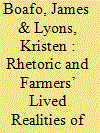

|
|
|
|
|
| Summary/Abstract |
This paper presents a political ecological analysis of the drivers and impacts of Green Revolution technologies – including improved seeds, chemical fertiliser and other agrochemicals – in the Brong Ahafo Region of Ghana. We identify national government, foreign investment and philanthro-capital as key drivers in shaping both narratives and uptake of Green Revolution technologies at the local level. Drawing from interviews and focus groups, our findings demonstrate that Green Revolution technologies deliver a range of negative local-level socio-ecological impacts, including increasing the overall costs of production, as well as exacerbating poverty and inequality amongst farmers. Our findings demonstrate the disconnection between claims that Green Revolution technologies increase food security and income, and lived experiences of farmers.
|
|
|
|
|
|
|
|
|
|
|
|
|
|
|
|
| 11 |
ID:
184121


|
|
|
|
|
| Summary/Abstract |
Using three definitions of the middle class (MC) and the Pakistan Social and Living Standards Measurement surveys from 2004 to 2014, we estimated the size of the MC and examined the correlates and consumption patterns of the MC for Pakistan. According to the absolute income, relative income and asset–ownership definitions, the MC grew by 16%, 8%, and 10%, respectively, from 2004 to 2014. The results of the biprobit model showed that the probability of entering the MC was associated with higher education, urban residence and non-agricultural employment. Additionally, the MC was associated with greater consumption of ordinary and luxury goods.
|
|
|
|
|
|
|
|
|
|
|
|
|
|
|
|
| 12 |
ID:
184130


|
|
|
|
|
| Summary/Abstract |
There are ongoing discourses on contract farming across the world. Contract farming is an issue of serious concern in India today, among farmers as well as policymakers. Such farming among small and marginal farmers, who are facing several problems in agriculture, requires special attention. Considering the large presence of small and marginal farmers and PepsiCo’s Frito-Lay model of potato contract farming in the state of West Bengal, which is India’s second largest producer of potatoes, a study is imperative from the perspective of small and marginal farmers and their participation in potato contract farming. The present paper discusses the nature and extent of participation of small and marginal farmers in potato contract farming in the state. Although participation is qualitative and interpretative in nature, the study considers the attributes which are mainly quantitative or measurable. In order to understand the nature and extent of the participation of small and marginal farmers in contract farming, the study also focuses on the participation of other stakeholders such as vendors and non-marginal and small farmers, and a comparison of socioeconomic conditions between the contract and non-contract farmers is undertaken.
|
|
|
|
|
|
|
|
|
|
|
|
|
|
|
|
| 13 |
ID:
184123


|
|
|
|
|
| Summary/Abstract |
Post-conflict North Waziristan is experiencing a fundamental shift in the political and economic environment at a very fast pace. This paper examines the complex political economy of post-conflict North Waziristan to assess factors promoting sustainable peace in the region. It identifies the multi-pronged official strategy that is significantly contributing to the transformation of the political and economic environment in the post-conflict setting. These steps include inter alia effective border management to counter illicit trafficking and cross-border terrorism, security sector reforms, improving the mechanism of governance, and diversifying ‘formal’ economic opportunities. The analysis suggests that post-conflict North Waziristan exhibits considerable improvements towards establishing and promoting conditions that are pivotal for sustainable peace.
|
|
|
|
|
|
|
|
|
|
|
|
|
|
|
|
| 14 |
ID:
184128
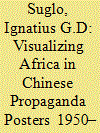

|
|
|
|
|
| Summary/Abstract |
This paper examines depictions of Africans in China during the period when China moved to establish diplomatic relations across the African continent – the foundation of what would become Africa–China relations today. Chinese posters were early forms of mass visual interaction with (the image of) foreign nationals. They reflect how Chinese society viewed itself in relation to others as it developed a global awareness through domestic mobilization. This study investigates how Africa and Africans are depicted in Chinese posters and how they shaped and/or reflected discourses of the period. It also examines motivations behind the inclusion of Africans in Chinese posters, arguing that this largely had a domestic rationale. By historicizing the meaning-making process of the image of Africa in 20th-century Chinese posters, this paper demonstrates that Chinese posters informed public opinion by defining friend and foe, focused more on China and her Cold War entanglements than on Africa, and simultaneously challenged and reinforced some widely held stereotypes about the continent.
|
|
|
|
|
|
|
|
|
|
|
|
|
|
|
|
|
|
|
|
|